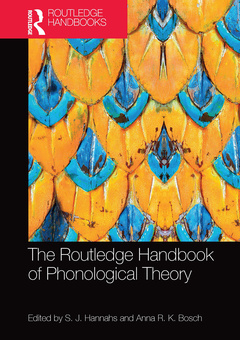Description
The Routledge Handbook of Phonological Theory
Routledge Handbooks in Linguistics Series
Coordinators: Hannahs S.J., Bosch Anna
Language: English
Subject for The Routledge Handbook of Phonological Theory:
Keywords
Substance Free Phonology; Faithfulness Constraints; Handbook of Phonology; GP; Routledge Handbook of Phonology; Markedness Constraint; Phonological Theory; Phonological Computation; Phonological Theories; Empty Nuclei; Handbook of Phonological Theories; Constraint Ranking; S.J; Hannahs; Word Level Phonology; Anna Bosch; Gorgia Toscana; theory neutral approach to phonology; Dependency Phonology; phonology Hannahs; Initial CV; phonology and phonetics; Generative Phonology; phonology; Lexical Phonology; Anna R; K; Bosch; Classic OT; Pavel Iosad; Sign Language Phonology; Martin Krämer; Prosodic Hierarchy; Michael Ramsammy; Nasal Substitution; Ricardo Bermúdez-Otero; Gestural Score; Thomas Purnell; Phonotactic Learning; Bert Vaux; Phonological Cycle; Neil Myler; Morphosyntactic Information; Heather Newell; OT Grammar; Tobias Scheer; Phonological Representations; Nancy C; Kula; Morph Relations; Eugeniusz Cyran; Syllable Structure; Harry van der Hulst; Jeroen van de Weijer; John Alderete; Paul Tupper; Joseph Paul Stemberger; Charles Reiss; Jordan Fenlon; Kearsy Cormier; Diane Brentari; Diana Archangeli; Douglas Pulleyblank; Abigail C; Cohn; Cécile Fougeron; Marie K; Huffman; Nancy Hall; Stefan A; Frisch; Iris Berent; Michael Hammond; Bart de Boer
Publication date: 06-2021
· 17.4x24.6 cm · Paperback
Publication date: 12-2017
· 17.4x24.6 cm · Hardback
Description
/li>Contents
/li>Readership
/li>Biography
/li>
The Routledge Handbook of Phonological Theory provides a comprehensive overview of the major contemporary approaches to phonology. Phonology is frequently defined as the systematic organisation of the sounds of human language. For some, this includes aspects of both the surface phonetics together with systematic structural properties of the sound system; for others, phonology is seen as distinct from, and autonomous from, phonetics. The Routledge Handbook of Phonological Theory surveys the differing ways in which phonology is viewed, with a focus on current approaches to phonology. Divided into two parts, this handbook:
- covers major conceptual frameworks within phonology, including: rule-based phonology; Optimality Theory; Government Phonology; Dependency Phonology; and connectionist approaches to generative phonology;
- explores the central issue of the relationship between phonetics and phonology;
- features 23 chapters written by leading academics from around the world.
The Routledge Handbook of Phonological Theory is an authoritative survey of this key field in linguistics, and is essential reading for students studying phonology.
1. The study of phonology in the 21st century: overview and introduction to The Routledge Hanbook of Phonological Theory
S. J. Hannahs and Anna R. K. Bosch
Part I
2. Optimality Theory: motivations and perspectives
Pavel Iosad
3. Current issues and directions in Optimality Theory: constraints and their interaction
Martin Krämer
4. The phonology–phonetics interface in constraint-based grammar
Michael Ramsammy
5. Stratal Phonology
Ricardo Bermúdez-Otero
6. Rule-based phonology: background, principles and assumptions
Thomas Purnell
7. Issues and prospects in Rule-Based Phonology
Bert Vaux and Neil Myler
8. The syntax–phonology interface in Rule-Based Phonology
Heather Newell
9. Government Phonology: Element Theory, conceptual issues and introduction
Tobias Scheer and Nancy C. Kula
10. Syllable structure in Government Phonology
Tobias Scheer and Eugeniusz Cyran
11. Interfaces in Government Phonology
Tobias Scheer and Eugeniusz Cyran
12. Dependency Phonology
Harry van der Hulst and Jeroen van de Weijer
13. Connectionist approaches to generative phonology
John Alderete and Paul Tupper
14. Interfaces in connectionist phonology
Joseph Paul Stemberger
Part II
15. Substance Free Phonology
Charles Reiss
16. The phonology of sign languages
Jordon Fenlon, Kearsy Cormier, and Diane Brentari
17. Phonology as an emergent system
Diana Archangeli and Douglas Pulleyblank
18. Laboratory phonology
Abigail C. Cohn, Cécile Fougeron, and Marie K. Huffman
19. Articulatory Phonology
Nancy Hall
20. Exemplar theories in phonology
Stefan A. Frisch
21. Algebraic phonology
Iris Berent
22. Statistical phonology
Michael Hammond
23. Phonology and evolution
Bart de Boer
S. J. Hannahs is a reader in linguistics at Newcastle University, UK. He is on the advisory board of the Linguist List and annual phonology conferences the Manchester Phonology Meeting and the Old World Conference on Phonology.
Anna R. K. Bosch is anAssociate Dean for Undergraduate Programs in the College of Arts and Sciences, and Associate Professor in Linguistics at the University of Kentucky, USA.
These books may interest you

Introducing Phonetics and Phonology 154.17 €



